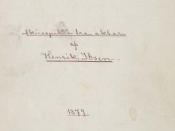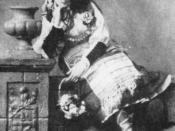Victorian texts either support or condone ways of thinking of 19th century English society predominantly through mediating the opinions of the author via characterisation in the texts. Individuals in the Victorian era generally conform to the dogmas and confines of society, its values and ideologies. However, ironically those who conform to the inherent restriction of their context are at times psychologically and physically affected. On the other hand, individuals who confront or resist social structures, via meta-psychological realisation of the value of individual autonomy are punished for nonconformity either directly or vicariously. Thus the relationships in Ibsen's A Doll's House and [ ] present the notion that the relationship between an individual and society is largely symbiotic.
"A Doll's House" encapsulates tensions between the struggle for autonomy and ingrained social expectations. The play was written at a time of social and intellectual change, which epitomised the second half of the 19th century when Marxism confronted authority.
Influence of social Darwinism is evident in the play's central paradox when Nora is developing a sense of independence and need for change but continues to play her stereotypical role of a frivolous wife dependent on her husband. Nora symbolizes the dichotomy of social conditions and inherited values of independence on the male. The juxtaposition of 'Can't manage without you' and Nora's own wilful individuality in forging a loan document to save her husband represents this as does her own personal view of being involved with monetary transactions 'It was almost like being a man'.
The signifying system, or Saussure, of drama reveals Nora confronting determining social forces of her life in a dramatic space which symbolises the environment that entraps her. This is evinced in the recurring motif of closing doors 'closes hall door', 'shifts door behind them' and 'the door...


